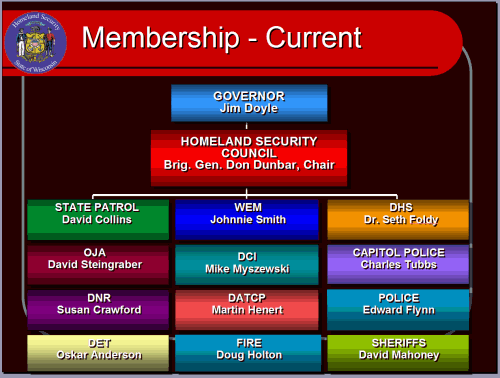In large-scale emergencies such as tornadoes, floods, and snowstorms, knowing where and when events have occurred is crucial. During the June 2007 floods in southern Wisconsin road closures due to high water had a huge impact on both the casual traveler, and businesses that depended on predictable and open transportation routes. Up-to-date and accessible geographic data, such as alternative travel routes, is a requirement for effective emergency response. In the above instance, this includes knowing which routes are closed, and identifying alternative travel routes in a comprehensive and timely manner, something that did not always happen across southern Wisconsin during last summer’s flooding emergency.
With this reality as background, at its regular meeting this month, the Wisconsin Homeland Security Council (HSC) heard a brief presentation on the value of good geographic information, and the necessity of coordination to share and make use of that information. Andy Swartz, GIS Coordinator for the City of Sun Prairie, did the presentation. Mr. Swartz represented the interests of the Wisconsin Geographic Information Coordination Council (WIGICC).
His presentation covered WIGICC’s structure, members, its stakeholder network, and a few examples of how widely available and the well-coordinated sharing of geographic information can be applied to homeland security problems and needs. Andy’s presentation was followed by a short question and answer period from HSC members. At the conclusion of the session, Brigadier General Don Dunbar, the state’s Adjutant General and HSC Chair thanked Mr. Swartz for the presentation, and further commented hat he appreciated the leadership and direction that WIGICC was taking with the very important matter of geographic information coordination and access. At its February 11 meeting this year, the WIGICC had agreed to work with the Wisconsin Emergency Management agency on developing the geographic information component of a statewide homeland security strategic plan.
Governor Jim Doyle created the HSC through executive order in 2003. The council is charged with coordinating outreach and directing homeland security operations. The council advises the governor, and works with federal and local agencies to respond to any threat. The council meets monthly, and has representatives from several state agencies, the state patrol, and other local police and fire organizations.

